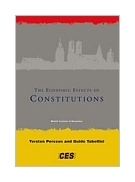|
||
• wydawnictwa polskie
• Zamów informacje o nowościach z wybranego tematu • kontakt
• Cookies na stronie |
ECONOMICS EFFECTS OF CONSTITITUTIONSwydawnictwo: MIT PRESS , rok wydania 2003, wydanie I cena netto: The authors of The Economic
Effects of Constitutions use econometric tools to study what they call the "missing
link" between constitutional systems and economic policy; the book is an
uncompromisingly empirical sequel to their previous theoretical analysis of economic
policy. Taking recent theoretical work as a point of departure, they ask which theoretical
findings are supported and which are contradicted by the facts. The results are based on
comparisons of political institutions across countries or time, in a large sample of
contemporary democracies. They find that presidential/parliamentary and
majoritarian/proportional dichotomies influence several economic variables: presidential
regimes induce smaller public sectors, and proportional elections lead to greater and less
targeted government spending and larger budget deficits. Moreover, the details of the
electoral system (such as district magnitude and ballot structure) influence corruption
and structural policies toward economic growth.
"This work is destined to be a much-read monograph on an important subject: how much we can learn from cross-sectional variation in certain constitutional rules across the world. It is much the best work on the issue to date." Timothy Besley, London School of Economics & Political Science "Persson and Tabellini's The Economic Effects of Constitutions beautifully complements their earlier Political Economics. This sequel defines and makes serious empirical progress on a broad research agenda for the complex issue of how constitutional statutes (from forms of government to electoral rules) shape policy outcomes (such as the size of the welfare state and the distribution of benefits). Written by two leading contributors to modern political economy, this stimulating and very readable book is essential for all those concerned with and involved in constitutional design." Jean Tirole, IDEI, Toulouse "The authors have succeeded in producing an extraordinary book that will open up this field and be the definitive reference for many years to come." Roger B. Myerson, W. C. Norby Professor of Economics, University of Chicago 190 pages Księgarnia nie działa. Nie odpowiadamy na pytania i nie realizujemy zamówien. Do odwolania !. |


